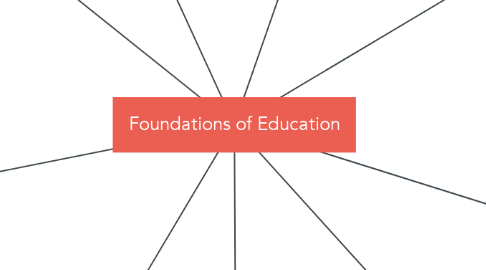
1. Sociological Perspectives
1.1. Theoretical Prospectives
1.1.1. 1. Functional Theory is supposed to create structures,programs,and curricula and encourages social unity.
1.1.2. 2. Conflict Theory believes the dominant groups impose their will on others through force,cooptation,and manipulation.
1.1.3. 3. Interactional Theory is primarily critiques of the functional and conflict theories.
1.2. 5 effects of schooling on individuals
1.2.1. 1. Knowledge and Attitudes- the amount of education a person receives correlates to how much a person reads and political and public affairs.
1.2.2. 2. Employment- the more education a person has makes them more employable.
1.2.3. 3. Mobility- the more educated a person is the more social mobility they have. education makes it easier to change social status.
1.2.4. 4. Teacher Behavior - the higher a teacher's expectations are for their students the more their students achieve.
2. History Of U.S. Education
2.1. Education For All
2.1.1. This reformation expanded education at the high school level from 25,000 to 6.5 million from 1875 til 1940. The NEA was established and devised a purpose for secondary education.
2.2. The Democratic-Liberal School
2.2.1. This
3. Politics Of Education
3.1. Purposes Of Education
3.1.1. 1.Intellectual
3.1.2. 2.Political
3.1.3. 3.Social
3.1.4. 4.Economic
3.2. Perspectives
3.2.1. Conservative Role of School
3.2.1.1. Educate to maximize economic and social productivity
3.2.2. Liberal Explanations of unequal educational performance
3.2.2.1. Use policies and programs to even opportunities of certain groups
3.2.3. Radical Definition of educational problems
3.2.3.1. 1.failed the marginalized
3.2.3.2. 2.promote conformity
3.2.3.3. 3.forgets the oppressed
3.2.3.4. 4.promotes inequality
4. Schools As Organizations
4.1. Stakeholders
4.1.1. Federal
4.1.1.1. Sen. Richard Shelby
4.1.1.2. Sen. Roy Moore
4.1.1.3. Rep. Robert Aderholt
4.1.2. State
4.1.2.1. Rep. Kerry Rich
4.1.2.2. Sen. Clay Scofield
4.1.2.3. State Education Superintendent Ed Richardson
4.1.2.4. State Board of Ed. Rep. Dr.Cynthia Sanders McCarty
4.1.3. Local
4.1.3.1. Boaz City School Superintendent Dr. Shannon H. Stanley
4.1.3.2. Boaz City School Board of Education Members Rhonda Smith,Tim Whitt,Rick Thompson,Jeff Roberts, and Chad Cofield
4.2. Elements of Change
4.2.1. School Processes
4.2.1.1. The degree of trust and openness within the team and between the team and the school. Transparency will influence future commitment from teachers and others involved.
4.2.2. School Cultures
4.2.2.1. Time,effort,intelligence, and goodwill relying heavily on teachers.
5. Curriculum And Pedagogy
5.1. Social Efficient
5.1.1. 1.Philosophical/Pragmatic approach
5.1.2. 2. Different curriculum for different students
5.1.3. 3. Schools were also to fix social problems
5.1.4. 4. School was run like a factory
5.2. 2 Dominant Traditions of Teaching
5.2.1. Mimic tradition is based on the idea that people imitate what they see others do or like
6. Equality Of Oppitunity
6.1. How does class, race, and gender each impact educational outcomes?
6.1.1. Class- teachers have been found to think more highly of upper and middle class students and lower for low and working class students.
6.1.2. Race-minorities do not receive the same quality of education and results as white students.
6.1.3. Gender-because men receive preferential treatment and women are not believed to be good at math.
6.2. What were the two responses to the Coleman Study from 1982?
6.2.1. 1. That average students did better in Catholic Schools.
6.2.2. 2. That more money equals a better education.
7. Philosophy Of Education
7.1. Exsistentialism
7.1.1. This philosophy says that each student must define himself and everything around themselves while figuring out life and it's obstacles as they go.
7.1.2. The founders of this philosophy are Soren Kierkegaard,Martin Buber,Karl Jaspers,Jean Paul Sartre, and Maxine Greene
7.1.3. The goal of this philosophy is the focus on the needs of the individual and it should stress individuality.
7.1.4. The role of the teacher in this philosophy is to take risks, expose themselves to resistant students and encourage the students to become in touch with the world around them and to choose and act on their own choices. teachers are to help understand the world around them by asking questions,generating activities,and working together.
7.1.5. The method of instruction for this philosophy is that each individual has their own unique learning style and the teacher must figure out the best way to teach each student.
7.1.6. The Curriculum for this philosophy stresses the humanities such as; art,drama,music,literature, and music while encouraging a lot of personal interaction.
8. Educational Inequality
8.1. Explain two types of cultural differences theory
8.1.1. 1. Bernstein's theory that working class has a different language that puts them at a disadvantage in school.
8.1.2. 2. Bourdieu's theory that affluent families give their children access to more cultural capital that gives them an advantage in school.
8.2. Describe at least four school-centered explanations for educational inequality.
8.2.1. 1. financing,research,curriculum,ability grouping,
9. Educational Reform
9.1. Describe two school-based reforms
9.1.1. No Child Left Behind-mandatory yearly testing,report school by school basis by race,ell,and special education, states must post yearly progress reports, and schools must have highly qualified teachers in core subjects.
9.1.2. Race To The Top- Adopted to prepare students to compete in school,and in the workplace. Build data systems to record students growth and success to inform faculty on areas of improvement. Recruiting and developing effective teachers. Turn around failing schools.
9.2. Describe at least two societal, economic, community, or political reforms.
9.2.1. 1.Charter Schools are public schools that are not as regulated as public schools but are held accountable for student progress. 2. School-to-work programs gave every student skills for their work environment,skills from structured training and work based learning experience, ensure the proper education for each career.

